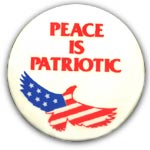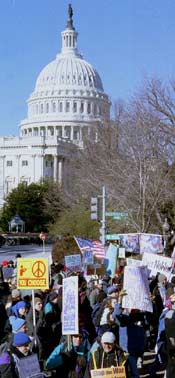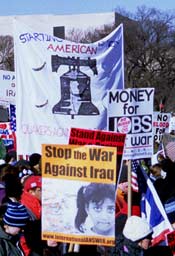|

 Protest is Patriotic by
Jo Freeman Protest is Patriotic by
Jo Freeman
A
somewhat different version of this article first appeared in the January
26, 2003 edition of Newsday.
 On Saturday, January 18, I spent four hours in the bitter cold on the
Washingoon Mall, along with a hundred thousand other patriotic
Americans, to tell the Bush Administration that we don't want the
US to attack Iraq. Most marchers brought their
own signs, on buses from all over the Eastern half of the country
(there was a separate march on the West Coast and smaller ones
in other cities). Unions, universities and religious groups, as
well
as the usual small left-wing sects, were well represented. The
marchers ranged widely in age and race. Signs and speakers spoke
from Christian
and Muslim perspectives, though I saw only one Israeli flag.
On Saturday, January 18, I spent four hours in the bitter cold on the
Washingoon Mall, along with a hundred thousand other patriotic
Americans, to tell the Bush Administration that we don't want the
US to attack Iraq. Most marchers brought their
own signs, on buses from all over the Eastern half of the country
(there was a separate march on the West Coast and smaller ones
in other cities). Unions, universities and religious groups, as
well
as the usual small left-wing sects, were well represented. The
marchers ranged widely in age and race. Signs and speakers spoke
from Christian
and Muslim perspectives, though I saw only one Israeli flag.
 I
did it despite the fact that I hate cold and can't think of anything
good about Saddam Hussein — a paranoid dictator who has persecuted
his own people and butchered minorities inside Iraq's borders. I
did it despite the fact that I hate cold and can't think of anything
good about Saddam Hussein — a paranoid dictator who has persecuted
his own people and butchered minorities inside Iraq's borders.
 I did it because the US is the world's only superpower, and as such there is
a real risk that our government could misuse its power if the American people
don't stand up and just say NO. I did it because the US is the world's only superpower, and as such there is
a real risk that our government could misuse its power if the American people
don't stand up and just say NO.
 I
did it because protest is an integral part of the American political system,
rooted firmly in our own Revolution and the many popular uprisings that preceded I
did it because protest is an integral part of the American political system,
rooted firmly in our own Revolution and the many popular uprisings that preceded it. It's one of the many ways of telling our government we think it is going
in the wrong direction. Because it requires some personal sacrifice — much
more than voting or writing letters — protest tells our leaders that
we think this issue is especially important and they need to pay attention. it. It's one of the many ways of telling our government we think it is going
in the wrong direction. Because it requires some personal sacrifice — much
more than voting or writing letters — protest tells our leaders that
we think this issue is especially important and they need to pay attention.
 Anti-war sentiment is nothing new. Democracies in general and Americans in particular
don't like sending their daughters and sons to fight and die in other people's
countries. When our leaders want to go to war they have to work their way around
this in-bred anti-war sentiment, sometimes through dishonesty and disinformation.
The Bush Administration has convinced about half the American people that Iraq
had something to do with 9/11 despite all evidence to the contrary. Our government
wants us to believe that if we invade Iraq we will protect our own homes from
future terrorism when the opposite is more likely to be true. Our government
wants us to believe that if we invade Iraq we will protect our own homes from
future terrorism when the opposite is more likely to be true. Both Timothy McVeigh
and Osama bin Laden turned against the US as a result of the 1991 Gulf War. Anti-war sentiment is nothing new. Democracies in general and Americans in particular
don't like sending their daughters and sons to fight and die in other people's
countries. When our leaders want to go to war they have to work their way around
this in-bred anti-war sentiment, sometimes through dishonesty and disinformation.
The Bush Administration has convinced about half the American people that Iraq
had something to do with 9/11 despite all evidence to the contrary. Our government
wants us to believe that if we invade Iraq we will protect our own homes from
future terrorism when the opposite is more likely to be true. Our government
wants us to believe that if we invade Iraq we will protect our own homes from
future terrorism when the opposite is more likely to be true. Both Timothy McVeigh
and Osama bin Laden turned against the US as a result of the 1991 Gulf War.
 Despite our revulsion at what happened on 9/11 and our concern that it never
happen again, it has taken a lot less time to mobilize hundreds of thousands
to protest a possible war in Iraq than it did to stop the war in Viet Nam. The
first large protests against that war didn't begin until President Johnson sent
US troops to shore up the South Viet Nam government in March of 1965. About 20,000
people marched on Washington on April 17 and similar numbers attended teach-ins
at various universities that Spring. It took two years before the number of protestors
approached those who marched last week. Despite our revulsion at what happened on 9/11 and our concern that it never
happen again, it has taken a lot less time to mobilize hundreds of thousands
to protest a possible war in Iraq than it did to stop the war in Viet Nam. The
first large protests against that war didn't begin until President Johnson sent
US troops to shore up the South Viet Nam government in March of 1965. About 20,000
people marched on Washington on April 17 and similar numbers attended teach-ins
at various universities that Spring. It took two years before the number of protestors
approached those who marched last week.
 In the decades since there have been many other large marches on almost every
imaginable issue. In the decades since there have been many other large marches on almost every
imaginable issue.
 The "No War in Iraq" protest drew upon the "Stop the War in Viet
Nam" tradition, and many of the same people. Those who protested the war
in Viet Nam were disproportionately young; the marchers I saw last week were
more representative. Many of us who had marched every year against the Viet
Nam War were there, as were our children and grandchildren, and their friends,
and
a lot of people who had marched on other issues, but not against war. The "No War in Iraq" protest drew upon the "Stop the War in Viet
Nam" tradition, and many of the same people. Those who protested the war
in Viet Nam were disproportionately young; the marchers I saw last week were
more representative. Many of us who had marched every year against the Viet
Nam War were there, as were our children and grandchildren, and their friends,
and
a lot of people who had marched on other issues, but not against war.
 While the protest tradition never died it was broken by World War II and the
Korean War, where opposition was linked to Naziism and Communist aggression.
The Cold War culture of anti-Communism, which made all dissent suspect, was an
even more serious damper on mass protest. The Civil Rights Movement's 1963 March
on Washington resurrected it, but mostly for those born after World War II. My
mother didn't like the War in Viet Nam but would never join an anti-war march;
in World War II she was a first lieutenant in the WACs. She let me do her marching
for her. While the protest tradition never died it was broken by World War II and the
Korean War, where opposition was linked to Naziism and Communist aggression.
The Cold War culture of anti-Communism, which made all dissent suspect, was an
even more serious damper on mass protest. The Civil Rights Movement's 1963 March
on Washington resurrected it, but mostly for those born after World War II. My
mother didn't like the War in Viet Nam but would never join an anti-war march;
in World War II she was a first lieutenant in the WACs. She let me do her marching
for her.
 Now that mass protest has regained its rightful place in the pantheon of political
tactics we still have to ask: do our leaders listen? Now that mass protest has regained its rightful place in the pantheon of political
tactics we still have to ask: do our leaders listen?
 They would have you believe that they don't. The newspapers made a point of reporting
that President Bush and our Congressional leaders were out of town when we marched
on Washington last week. But our leaders read the newspapers, or at least the
press summaries prepared by their staff. They also read the polls, and the people
who respond to pollster's questions read the newspapers, and watch TV, and sometimes
personally know some of us who marched. They would have you believe that they don't. The newspapers made a point of reporting
that President Bush and our Congressional leaders were out of town when we marched
on Washington last week. But our leaders read the newspapers, or at least the
press summaries prepared by their staff. They also read the polls, and the people
who respond to pollster's questions read the newspapers, and watch TV, and sometimes
personally know some of us who marched.
 Protest
may not get our leaders attention quickly, but it does help to shape public
opinion. When our leaders want to do something drastic, like go to war,
they don't hold a national referendum to find out what the people want. They
tell us what to think. Those who want to disagree have to find ways of reaching
the public. Protest is one of those ways — sometimes the only way. In
addition to the immediate publicity a large march brings to a particular view,
it opens the doors to discussion. When the marchers return home they may find opportunities
to talk about why they marched to classes and civic groups and family members
and talk shows and on-line chat rooms. This is how ideas spread and opinions
are developed.
Experience has taught us that protest by itself won't change policy. It did take
eight years to get our troops out of Viet Nam. But protest, especially mass protest,
cracks the facade of consensus. It arouses and it educates. It gives opposition
within the leadership, or opposition to it, a constituency to represent. Without
such a constituency, without being able to say there are a lot of people out
there who don't think we are doing the right thing, without outside opposition,
inside opponents usually stay silent. Protest
may not get our leaders attention quickly, but it does help to shape public
opinion. When our leaders want to do something drastic, like go to war,
they don't hold a national referendum to find out what the people want. They
tell us what to think. Those who want to disagree have to find ways of reaching
the public. Protest is one of those ways — sometimes the only way. In
addition to the immediate publicity a large march brings to a particular view,
it opens the doors to discussion. When the marchers return home they may find opportunities
to talk about why they marched to classes and civic groups and family members
and talk shows and on-line chat rooms. This is how ideas spread and opinions
are developed.
Experience has taught us that protest by itself won't change policy. It did take
eight years to get our troops out of Viet Nam. But protest, especially mass protest,
cracks the facade of consensus. It arouses and it educates. It gives opposition
within the leadership, or opposition to it, a constituency to represent. Without
such a constituency, without being able to say there are a lot of people out
there who don't think we are doing the right thing, without outside opposition,
inside opponents usually stay silent.
 The
strength of American democracy is that there are many ways of making our voice
heard. Its durability comes from the fact that the pot is always boiling.
It is when dissent is discouraged that our democracy is endangered. Our political
system is built on checks and balances. Mass marches and other protests are one
such check on power. The
strength of American democracy is that there are many ways of making our voice
heard. Its durability comes from the fact that the pot is always boiling.
It is when dissent is discouraged that our democracy is endangered. Our political
system is built on checks and balances. Mass marches and other protests are one
such check on power.
 We may not prevent a war on Iraq. All signs are that the President is determined
to depose Saddam Hussein, whatever the cost. In the bad old days of the Cold
War, the eastern bloc provided a check on the unlimited use of American power.
Now that we are the world's only superpower, it is more important than ever before
that the American people speak out on foreign policy as well as domestic issues.
Protesting our government's actions, or its stated intentions, when we don't
like them, is the American way.
We may not prevent a war on Iraq. All signs are that the President is determined
to depose Saddam Hussein, whatever the cost. In the bad old days of the Cold
War, the eastern bloc provided a check on the unlimited use of American power.
Now that we are the world's only superpower, it is more important than ever before
that the American people speak out on foreign policy as well as domestic issues.
Protesting our government's actions, or its stated intentions, when we don't
like them, is the American way.
|
|